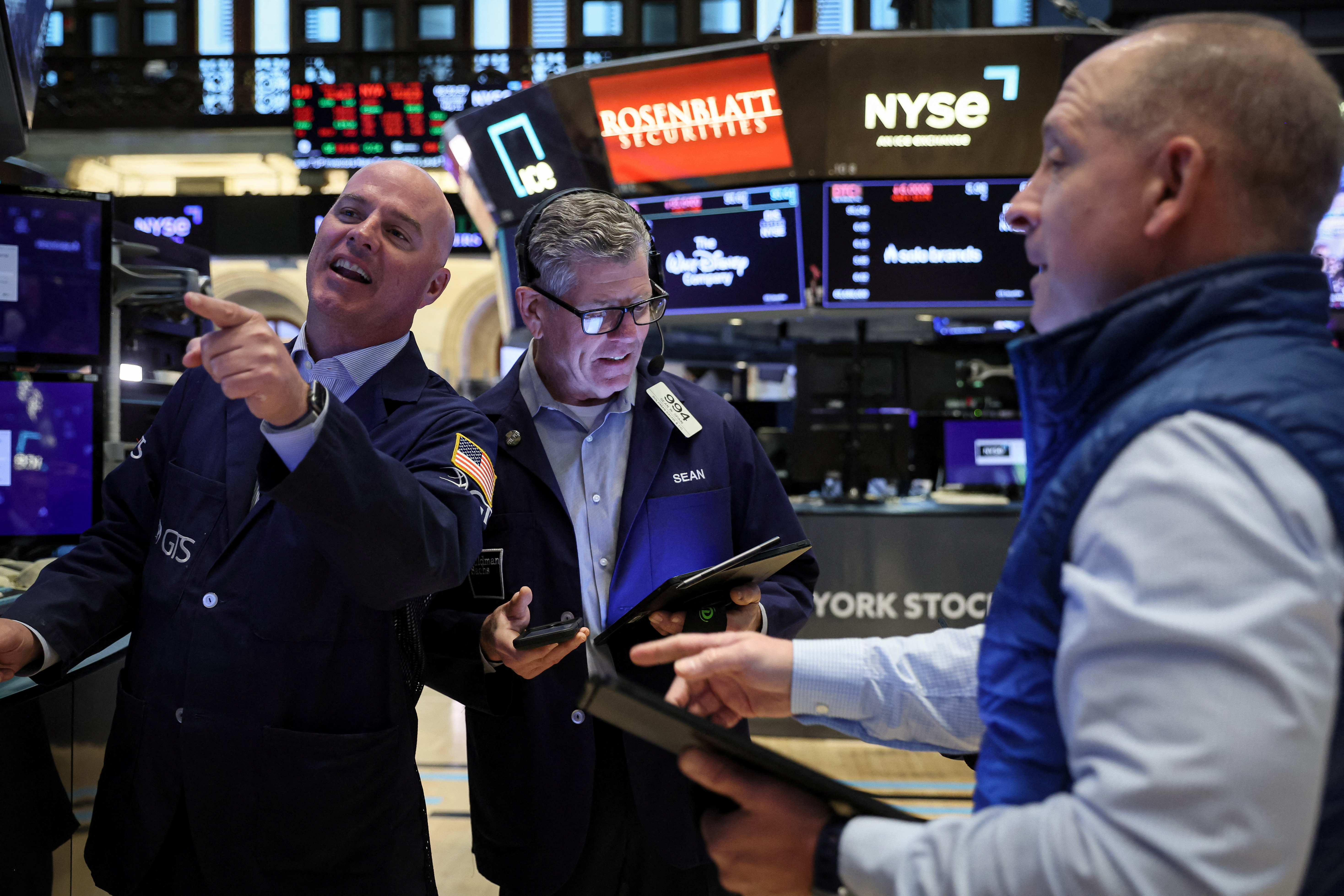- US consumer sentiment drops to six-month low in May
- Oil prices, Treasury yields fall for week
- Dollar notches biggest weekly gain since September
- U.S. stocks slips, European shares gain
Stocks slip as US consumer confidence slumps, dollar gains
May 14, 2023

[1/3] Traders work on the floor of the New York Stock Exchange (NYSE) in New York City, U.S., May 11, 2023. REUTERS/Brendan McDermid
SYDNEY, May 12 (Reuters) – The dollar rose on Friday but a gauge of global stocks retreated on a report that showed U.S. consumer sentiment slumped to a six-month low in May, reinforcing bearish investor sentiment over talks to raise the U.S. government’s debt ceiling.
The dollar strengthened against the euro, yen and other currencies as it rose 1.4% for the week, its biggest weekly gain since September, as concerns about the government’s borrowing cap and Federal Reserve monetary policy prompted a shift to safe havens.
The Congressional Budget Office warned on Friday that the United States faced a “significant risk” of defaulting on payment obligations within the first two weeks of June without raising the government’s $31.4 trillion debt ceiling, adding that payment operations will remain uncertain throughout May.
U.S. consumer sentiment slumped to a six-month low in May on worries that political haggling over raising the borrowing cap could trigger a recession, the University of Michigan survey showed.
“Lack of confidence in the economy is translating to a retreat to the safer dollar and is also causing pessimism about oil demand,” said John Kilduff, partner at Again Capital LLC in New York.
The dollar index , a measure of the greenback against six other major currencies, rose 0.59% on the day as oil prices slid for the fourth straight week.
Longer-dated Treasury yields were on track to end the week lower too – though the yield on benchmark 10-year notes was up 6.7 basis points to 3.464% – on bets the Fed will stop hiking rates at its next meeting in June.
But Fed Governor Michelle Bowman said in prepared remarks that the U.S. central bank probably will need to raise interest rates further if inflation stays high. The consumer price index (CPI) and producer prices this week showed inflation is slowing.
There could be a situation where U.S. inflation decelerates further and the dollar’s value declines, with European inflation staying high, said Thierry Wizman, Macquarie’s global FX & interest rates strategist in New York.
“Given that scenario the Fed does not have to cut rates because it wouldn’t be until the end of the year that they would have a look-back on inflation and see whether it came in below their own projection of 3.6% for core PCE,” he said, referring to the personal consumption expenditures price index which the Fed uses as its primary measure of consumer inflation.
There is extreme pessimism around the debt ceiling, said Thomas Hayes, chairman and managing member of Great Hill Capital LLC in New York. But better-than-expected earnings and hopes for a soft landing have kept a floor underneath stocks.
“You couple earnings estimates starting to go up with a Fed on hold, and that’s a formula for good things to happen,” Hayes said.
MSCI’s U.S.-centric gauge of stocks across the globe (.MIWD00000PUS) closed down 0.23%. But the pan-European STOXX 600 index (.STOXX) rose 0.40% after upbeat results from Richemont underscored strength in the luxury sector.
On Wall Street, the Dow Jones Industrial Average (.DJI) closed slightly lower, down 0.03%. The S&P 500 (.SPX) fell 0.16% and the Nasdaq Composite (.IXIC) lost 0.35%.
The two-year Treasury yield, which often moves in step with interest rate expectations, was up 8.3 basis points at 3.989%.
Next week, investors will scrutinize U.S. data for rate clues, with retail sales and industrial production figures. “The former should get a lift from robust auto sales, while the latter will be held back by falling production,” ING bank said.
CHINA LOSING STEAM
China’s economic recovery seems to be losing steam, with new bank loans tumbling in April, consumer prices rising at the slowest pace in more than two years and imports unexpectedly contracting, driving a plunge in commodity prices from copper and iron ore to oil.
China’s blue-chips (.CSI300) fell, pushing losses for the week to 2.0%, while Hong Kong stocks (.HSI) slid 0.5% on the day.
In Asia, MSCI’s broadest index of Asia-Pacific shares outside Japan (.MIAPJ0000PUS) fell 0.6% and was headed for a weekly decline of 1.4%.
Japanese shares outperformed, with the Nikkei (.N225) climbing 0.9% to its highest level since November 2021, as investors cheered announcements of increased shareholder returns during earnings season.
U.S. crude futures fell 83 cents to settle at $70.04 a barrel and Brent settled down 81 cents at $74.17.
U.S. gold futures settled down 20 cents at $2,014.50 an ounce.
Reporting by Stella Qiu; Editing by Kim Coghill
Our Standards: The Thomson Reuters Trust Principles.
[ad_2]
Source link


